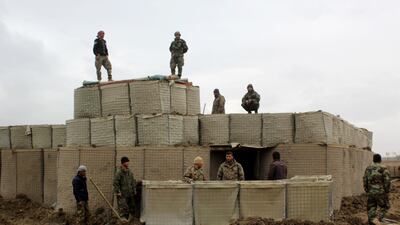Several Taliban prisoners who were released by the Afghan government as a condition for peace talks have taken up arms again, the government's lead negotiator Abdullah Abdullah said on Tuesday.
Mr Abdullah, the chairman of the High Council for National Reconciliation, said discussions with the Taliban in Qatar have so far been positive.
However, he said some, though not the majority, of the 5,000 Taliban prisoners released by the government as a condition for talks resumed the fight against Kabul.
"I do know that some have returned to the battlefield, which is a violation of the agreement that they had made," Mr Abdullah said during an online conference with the US Council on Foreign Relations.
He said talks between the two sides had begun in Doha on a positive note, as the delegations build some familiarity with each other.
Yet the level of violence in Afghanistan has not dropped and he called on the US, which started the peace process with its own deal with the Taliban, and Pakistan, which maintains ties to the insurgents, to pressure them to agree to a ceasefire.
"Unfortunately, so far, the level of violence is very high and to a level that is not acceptable for the people," Mr Abdullah said.
"I repeat my call to the Taliban themselves and also to all partners who have any leverage over the Taliban to press on that point."
Mr Abdullah said he planned to visit Pakistan in the coming days, his first trip to the country since 2008.
The persistent violence, and the Taliban's failure to completely cut relations with ISIS and Al Qaeda, was singled out as a barrier to success by US officials testifying in Congress on Tuesday.
US chief negotiator Zalmay Khalilzad said a reduction of US troops in Afghanistan, under the terms of the US-Taliban agreement, would be brought to a halt when about 4,500 remain in the country in November.
Washington will then assess whether the insurgents are living up to their pledges.
"Further withdrawals will be determined based on conditions on the ground and delivery by the Taliban on their commitments," Mr Khalilzad told a hearing of the House oversight committee.
The US reduced troop numbers in Afghanistan by more than half from more than 12,000.
With President Donald Trump promising to end US involvement in wars abroad, Washington pledged to withdraw all forces by May 2021, if the Taliban and the government can achieve a solid peace agreement.
"By any measure, the current levels of violence are too high. We know that the reductions are possible," Mr Khalilzad said.
Short ceasefires were respected by the Taliban in the past, he said.

